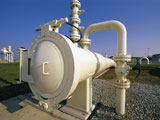Europe Focuses on Southern Energy Corridor
By Robert M Cutler for ISN
When EU Energy Commissioner Gunther Oettinger external pagetold an energy forum in Sofiacall_made on Tuesday that the EU “wants a direct [Southern Corridor energy] connection to the Caspian and the Middle East region,” press attention focused on his corollary, “We will not … stand in the way of [the Russian-sponsored] South Stream.” However, less attention was paid to his positive affirmation of support for the (Azerbaijan-Georgia-Romania) White Stream project for a gas pipeline under the Black Sea directly, from the South Caucasus to the EU.
Europe’s search for energy security
A former Principal of the Secretariat of the Presidency of the European Parliament, and current director of the EquipEuropa analysis and training consultancy in Brussels, explained the significance of Oettinger’s words to ISN Security Watch.
“Europe today seeks to avoid reliving past bad experiences of overdependence on specific sources and lines of gas transmission and wishes to be less dependent on any single source,” said Alexander von Lingen, who has long experience with Central and Eastern European countries that are now EU members.
As a result, he added, the EU seeks “actively to promote the search for diversification [of sources as well as lines of transmission] on a purely economic and commercial basis without political restraints.”
This was also why the EU adopted its ‘Southern Corridor’ strategy at the May 2009 Prague Summit, which includes the White Stream pipeline along with the Nabucco pipeline and the Italy-Turkey-Greece Interconnector (ITGI).
The White Stream project would provide natural gas from the Caspian Sea basin with a route to Europe that passes neither through Russia nor Turkey. The gas would go across Azerbaijan and Georgia to Supsa, then under the Black Sea to Constanta, Romania, and from there directly to other EU members.
The EU’s own feasibility study for the White Stream project foresees that after Constanta the line would run into Italy following the route of the Pan-European Oil Pipeline.
Of the two priority projects endorsed at a conference attended by EU representatives in Batumi, Georgia, seven weeks ago, the construction of the White Stream natural gas pipeline under the Black Sea to Constanta is much more significant than the reversal of the Odessa-Brody Pipeline for oil inside Ukraine. Given the inauguration of Viktor Yanukovych as president of Ukraine, the latter is less likely to be followed up.
The historical perspective
Europe has never in its diplomatic history seen a situation like the present, where neither Russia nor Turkey is a weak power, and where there is an entente if not an alliance between them. And this is the case today: There can be no mistaking a de facto geo-economic alliance between the two countries focused on energy yet also extending to other economic sectors.
The Southern Corridor strategy is the proper response to such a situation. The closest historical analogy to it may be the extension of German influence into Asia Minor at the end of the 19th century, in the years following Bismarck's departure from office after having unified Germany.
But in that international system, in contrast to the present, Ottoman Turkey was a weak state and the Russian Empire ruled the Caucasus; so the displacement slightly northward of European influence into Black Sea-South Caucasus-Caspian Sea corridor is today’s natural and correct adaptation.
The portrayal of South Stream and Nabucco as no longer in opposition to one another originated in and is a result of this Russo-Turkish entente that seeks to block the White Stream project: just as, a decade ago, the campaign for the Blue Stream pipeline under the Black Sea between the two countries successfully blocked the Trans-Caspian Gas Pipeline then under consideration (and which has once again become a possibility associated with White Stream).
An emerging community of practical interest
White Stream, on the other hand, as von Lingen puts it, “responds to Europe’s new emerging view of its energy security and also it accommodates the interests of the EU’s new members in the wider Black Sea region.”
Accompanying the reports that Nabucco and South Stream are no longer mutually exclusive are suggestions that the EU does not need Caspian gas directly because the economic crisis is decreasing its consumption and also because of other developments such as the Russia-sponsored Nord Stream project for natural gas under the Baltic Sea to Germany.
Von Lingen, though, affirms that Europe’s tendency to diversify natural gas sources and pipelines “will only grow in the coming years as the EU economies recover from the crisis, and long-standing initiatives for shifting from oil and coal to gas come to fruition,” which will continue to increase European demand for natural gas.
There is, therefore, an external pageemerging community of practical interestcall_made between the EU and the Turkic energy-exporting countries of the Caspian Sea basin.
Fariz Ismailzade, director of the Azerbaijan Diplomatic Academy’s Advanced Foreign Service Program in Baku, while not mentioning White Stream in particular, told ISN Security Watch that “Azerbaijan’s gas production will rise sharply in the next years.”
Consequently, he explains, “Azerbaijan is generally interested in diversity of export routes. … Because [the] EU’s gas demand is rising anyway … everyone will win from more pipelines in the region.”
As Azerbaijan’s ambassador to Kazakhstan external pageLaytif Gandilov recently confirmedcall_made, Azerbaijan could supply even more than the 8 billion cubic meters per year (bcm/y) called for in White Stream’s first stage: If construction began in 2012, then the pipeline could enter into service in 2015.
At the same time, Gandilov underlined the need to build a pipeline system connecting Azerbaijan with Central Asia, saying, “Kazakhstan, Azerbaijan and Turkmenistan will always support the building of this system.”

